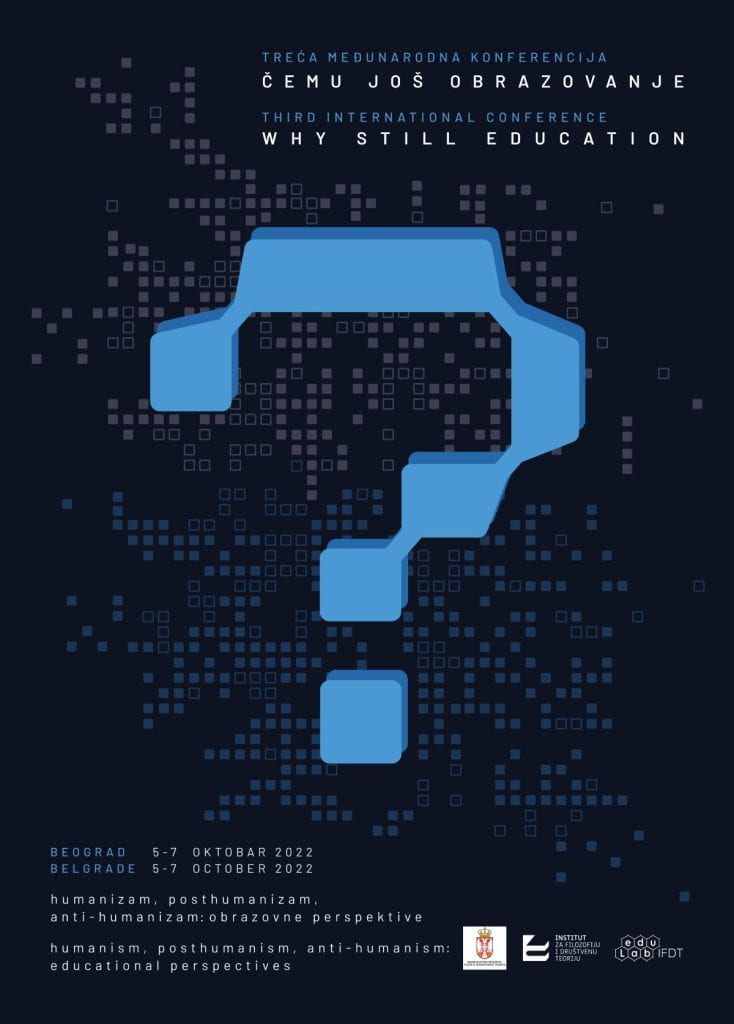Reflection on WSE by Mohammad Khari
 The third international conference on “Why Still Education? Humanism, Posthumanism, Anti-Humanism: Educational Perspectives” took place from 5-7 October 2022 at the Institute for Philosophy and Social Theory in Belgrade, Serbia.
The third international conference on “Why Still Education? Humanism, Posthumanism, Anti-Humanism: Educational Perspectives” took place from 5-7 October 2022 at the Institute for Philosophy and Social Theory in Belgrade, Serbia.
Organized by EduLab, this conference invites scholars and educators from around the world to discuss humanism, posthumanism, and anti-humanism in education. The keynote speakers for the event included Rosi Braidotti (Utrecht University, Netherlands), Stefan Lorenz Sorgner (John Cabot University in Rome, Italy), and Carol Taylor (University of Bath, UK), all experts in their respective fields. The conference seeks to explore the impact of the posthuman paradigm on educational theory and practice and the ways in which education can absorb new forces while staying true to its ancient mission and meaning. Participants will examine topics such as:
- Digital pedagogies
- Techno utopias and dystopias
- Rhizomatic modes of learning
- New ethical approaches to education
- Critical histories and decolonial perspectives and practices
- Located and place/space/land-based pedagogies
- Body and movement in education
- Relational ontologies and epistemologies
- Global and local citizenship
- Diffractive imaginaries
- Artistic imaginaries, art, and literature as/in pedagogy
- Material/materiality in educational practice
- Morals and/in education
- New educational cultures and communities
- More-than-human world-building, ecologies, and education
From ScOLa, Mohammad Khari had a presentation on “Rhizomatic Modes of Learning”. You can find the details below:
Title:
Embracing the Uncertainty: Fostering Creativity and Responsibility through Storytelling in Rhizomatic Modes of Learning
Abstract:
Inspired by Deleuze and Guattari’s ideation of rhizome, Rhizomatic Learning, presented by
Kraus and popularized by Cormier, views learners as “nomads” in the dynamic process of
“becoming” in a living network of knowledgeable agents – both human and artificial – and
material objects. This study argues that together with stories, which according to the
neuroscientific educational literature are eminently brain-friendly, Rhizomatic Learning has the
potential to foster creativity, critical thinking, and responsibility, making the community of the
“network natives” the curriculum, thereby, offering the necessary skills to deal with uncertainties
both in the educational environment and the larger-scale societies. Therefore, learning can be
considered as the creative capacity of such rhizomes i.e. stories to build upon existing resources
that is schemata and create new connections, consequently acquiring new “nodes”, and
expanding even further in different directions. Rhizomatic Learning; therefore, can be used as an
asset to go beyond the existing curricula and assessment systems, without completely dismantling
them, to help learners fathom the uncertainties better and approach them critically.
Keywords:
Rhizome, Rhizomatic Learning, Becoming, Storytelling, Creativity, Neuroscience
The video recordings of the conference are available here and Mohammad’s session can be found here.

Leave a Reply